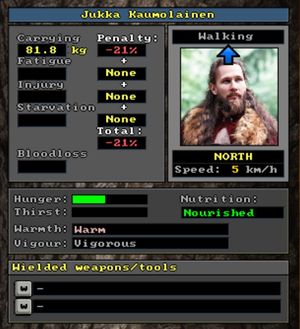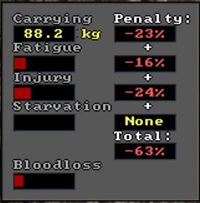Status
The status of the current player character is always displayed on the right side of screen in the main gameplay view, whether the character is situated on wilderness map or zoomed-in view.
Many different conditions impact the character's ability to survive and use their skills effectively. The status panel is broken up in five main sections: Physical penalties, heading and movement, metabolism, wielded weapons or tools, and the message log and command display.
Full name of the player character and text for help and options (Esc) are also displayed above and below the main sections of status, at the very top and bottom, respectively.
Contents
Physical penalties
Your character's physical performance and mastery of skills will be impaired due to physical penalties which are classified as encumbrance, fatigue, injury and starvation. These penalties reflect the fact that a character who is carrying extensive load, fatigued, injured or starving cannot function normally.
Physical penalties measure how much a character's skills are reduced when they are put into action, as well as adversely affecting some other parameters such as mobility. The total amount of physical penalty is directly subtracted from the player's value in skill, though the effective value of a skill cannot go lower than 5% (or higher than 95%).
Encumbrance
Encumbrance is the amount of weight a character is carrying. Characters are usually subject to some encumbrance penalties at most times, as it includes the weight of their clothing, tools, weapons and so on. A character can carry a weight up to one and half times their own weight. Going beyond that limit will immediately set encumbrance penalty 100% and prevent movement and most other actions.
The amount of encumbrance penalty is directly affected by the weight of items carried in the character's inventory, so gaining or losing items in any way results in immediate change of encumbrance. Items that are being moved and hauled along do not impact this penalty.
Besides increasing physical penalty, encumbrance also factors into a character's mobility.
Fatigue
Characters become fatigued by performing physically demanding actions such as running, fighting, crafting, rowing on a watercraft, hauling items that are not packed in their inventory, and so on. Having fatigue of 100% or more will prevent movement and most other actions.
Fatigue is automatically reduced by pass of time when not performing physically demanding actions. Standing still and waiting equals resting, which can be done one turn at a time with press of . or holding the key down, or initiating continuous wait-and-rest action by pressing -.
Like encumbrance, the amount of fatigue also affects a character's mobility.
Injury
Receiving an injury will have immediate effect on physical penalty. The location and severity of the injury received on the character's body will cause varying amount of injury penalty. A character who receives injuries amounting to 100% penalty will die.
Injury penalty is reduced as the state of injuries is improved through any form of healing, either through injury treatment by the character themselves (F7) in combination with natural healing, or visiting a sage and requesting their healing.
Different types of injuries can affect the character's actions in different ways besides just increasing physical penalty. For example, a character with leg wound will move and maneuver with more difficulty.
Starvation
Starvation is a condition that is caused by the character's nutrition value staying at the level of Starving for too long. Starvation level adds to the character's physical penalty. A character who accumulates maximum starvation penalty will experienced reduced effectiveness in many actions and eventually starve to death.
Starvation can be reduced and prevented by increasing and maintaining the level of nutrition. Simply filling the character's stomach is only the first step in improving their nutrition, which is a slow process. Recovery from state of nutritional starvation will take some time. Some herbs can promote recovery from starvation.
Bloodloss
This meter displays amount of blood lost due to bleeding wounds. How much blood loss a character can endure is based on their Endurance attribute. A character at their limit of blood loss is subject to losing consciousness or even death.
Bloodloss is removed automatically over several days by natural regeneration. Accumulation of further blood loss is be prevented by stopping bleeding through injury treatment F7 or by performing a spell with blood-staunching prayer (F4) if the character knows it.
Heading and movement
This section found in the upper right corner of the game screen displays the following:
- The character's state of movement: Walking, Running, Hiding, Fallen (prone or crawling due to any effect or voluntarily), Swimming or Wading in water and Sleeping
- The player portrait, with direction the character is facing displayed by blue arrow and the direction of incoming audio cues displayed with yellow burst icon
- The current direction of facing displayed by yellow text in compass directions, below the player portrait
- The current total mobility of the character, shown in distance per hour (in kilometers or miles), as influenced by positive and negative factors like encumbrance or running movement
Metabolism
The middle section of the character's status panels contains information about metabolical functions of their body.
Hunger
Hunger is the character's desire for food. A character can function relatively normally even with great hunger, but neglecting satisfying of hunger will inevitably lead to loss of nutrition and further consequences such as being woken up from sleep by terrible hunger.
Hunger is increased by physically demanding actions and sustaining on poor diet. It can also be temporarily increased by consuming certain herbs, which together with abundant food source or reserves can be useful in quickly treating low nutrition.
Hunger can be reduced by eating food (e), and its accumulation is reduced by maintaining a rich diet.
Thirst
Thirst is the character's need for water. Increase of thirst will stay roughly same regardless of actions or state of character.
Lack of water will eventually result in dehydration and loss of physical functionality, such as being woken up from sleep due thirst and becoming too weak to stand. Humans cannot survive for long without water.
Thirst can be satisfied by drinking (q) from any water source or drinking water from a container in the character's inventory.
Nutrition
The character's nutrition measures how well fed they are on longer term. The stages of nutrition from best to worst are Abundant, Well-fed, Nourished, Good, Temperate, Scarce, Insufficient, Malnourished and Starving.
Maintaining a high state of nutrition reduces rate of hunger, while poorer states will increases it. A character in good state of nutrition is in possession of greater energy reserves and is unable to eat raw, spoiled or unclean food. Reaching the state of Starving will lead to accumulation of starvation penalty.
Nutrition is increased by eating food, especially energy-rich food containing good amount of fat or protein, such as meat from larger mammals or fish. Loss of nutrition can be reduced by eating properly; high-energy food does not need to be consumed too often, while low-energy food needs to be consumed more regularly and often. Some herbs also aid against loss of nutrition.
Warmth
Warmth displays the character's experience of current temperature. From hottest to coldest, the stages of warmth are Sweating a lot, Sweating, Hot, Warm, Rather warm, Comfortably warm, Cool, Chilly, Cold, Bitterly Cold, Numbingly Cold, Freezing and Freezing to death.
There is no adverse effects in staying constantly hot, but having a character stay too cold for too long can result in interrupted actions (such as waking from sleep due to cold), hypothermia, loss of consciousness, and death. The colour of the text displaying the state of warmth, ranging from red to blue, can be used to judge if the character is experiencing excess heat or net loss of it, or just staying neutral.
Gaining warmth:
- Build a fire, and stay near it
- Wear clothing, especially fur or wool clothing
- Stay indoors of buildings, especially heated rooms
- Throwing water on the hot stove of sauna
Losing warmth:
- Stay outside in cold weather (geographical locations further north have colder weather than in the south)
- Wear reduced amount of clothing or clothing with poor protection against cold
- Being immersed in water entirely or partially (swimming or wading – you can inspect (F3) the temperature of water at a close distance)
The state of warmth is not indicative of complete protection from elements. It's possible to maintain comfortable net body heat while still having exposed body parts (often hands, feet or head) which are at a risk of developing frostbite injury.
It's possible to check warmth value of currently worn clothing by opening the armour coverage statistics interface by pressing Shift+A and then pressing w to toggle display for protection against cold.
Vigour
Vigour represents how energized and awake to how tired and sleepy the character is. The states of vigour from most awoke to most sleepy and tired are: Vigorous, Lively, A bit tired, Tired, Weary, Extremely tired and Ready to drop.
Vigour is reduced as the day passes on, and from physically demanding actions. A tired or exhausted character will accumulate fatigue faster and generally perform slower or less efficiently in most actions. Extreme states can result in being able to sleep even while it's raining or snowing, stumbling and falling down, being unable to stand, or loss of consciousness.
Some actions cannot be initiated with insufficient vigour, such as sleeping while the character is feeling vigorous, or physically demanding actions while extremely tired. The Will attribute determines the ability to stay awake while exhausted and sleepy.
Vigour is restored by sleeping and consuming certain herbs. Comfortable sleeping and going to sleep before becoming too exhausted reduces the need for sleep. Certain herbs can also be conductive to sleeping and help restore vigour efficiently that way.
Wielded weapons/tools
This part of the status view simply displays what items are being held in the character's hands.
For most actions it's not necessary to wield a tool before beginning its use, as this part of the action is usually automatic. Free-form actions with a tool or weapon such as fighting, skiing or moving a watercraft require wielding appropriate item in either or both hands.
Wielding just one item and leaving the other hand "empty" generally allows using both hands to use the same item, such as in case of wielding weapons for two-handed use.
Message log and command display
The yellow-brown colored message log box displays the most recent messages of actions and events. Larger log of the previous several thousand messages can be found inside the character's save folder in the msglog.txt file. Different colors of text is used to indicate various information, red being used for high priority events such as loss of character functionality due to insufficient vigour or a body part being exposed to cold temperatures.
The command display shows the currently selected action or action that is still being processed through menus or pass of time, such as selecting bait for active fishing or butchering a carcass.
Below the command display is the repeat command display that will show the last applicable action that can be quickly repeated by pressing r, such as repeating Active fishing without going through all the menus.
Gallery
A character in state of hiding in stealth while facing southwards when they have just heard a sound cue from the direction of west.




